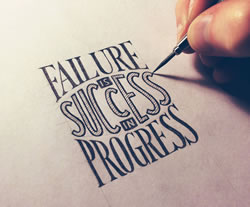Everyone meets the occasional failure in their career progression, but Travis Bradberry* says that for people with the right attitude, failure is a teacher rather than a disaster.
 Everyone fails in life from time to time, and failure can be a crushing experience.
Everyone fails in life from time to time, and failure can be a crushing experience.
The only thing that separates successful people from the rest is how they respond after they fail.
When facing obstacles, you have to decide if you’re going to let them be the excuse for your failure, or if you’re going to make them the story behind your success.
When you adopt the right attitude, failure is a great teacher.
Failure interrupts your routine and gives you an opportunity to explore new solutions, but only if you have the right attitude.
Psychologist, Albert Bandura conducted a study that showed just how great a role our attitudes play in the face of failure.
In the study, two groups of people were asked to complete an identical management task.
The first group was told that the purpose of the task was to measure their management abilities.
The other group was told that the skills required to complete the task were improvable and that the task was merely an opportunity to practice and improve.
The trick was that the researchers made the task so difficult that all participants were bound to fail, and fail they did.
The first group — feeling like failures because their skills weren’t up to snuff — made little or no improvement when they were given opportunities to repeat the task.
The second group, however, saw each failure as a learning opportunity, and they performed at progressively higher levels each time they attempted the task.
Just like the participants in the study, we can either view our failures as reflections of our abilities or as opportunities for growth.
The next time you catch yourself wallowing in the self-pity that often accompanies failure, focus on what you can control: Your attitude.
Some of the best lessons in life are also the toughest to accept.
These are the lessons that challenge your flexibility and willingness to learn.
When we don’t embrace them soon enough, the lessons we learn turn out to be harsh ones.
When you want to achieve something important, that first step is inevitably going to be daunting, even frightening.
People that dive headfirst into taking that brutal first step aren’t any stronger than the rest of us; they’ve simply learned that it yields great results.
They know procrastination only prolongs their suffering.
Success, above all, requires time and effort.
Author, Malcolm Gladwell suggested that mastery of anything requires 10,000 hours of tireless focus.
Consider author, Harry Bernstein, who dedicated his entire life to writing before he finally landed a best-seller at the age of 96.
Look at everyone around you.
They all seem so busy, running from meeting to meeting and firing off e-mails.
Yet how many of them are really producing at a high level?
Success doesn’t come from movement and activity; it comes from focus — from ensuring that your time is used efficiently and productively.
You get the same number of hours in the day as everyone else, so use yours wisely.
There are too many extenuating circumstances in life to control every outcome.
You can, however, control how you react to things that are out of your control.
Your reaction is what transforms a mistake into a learning experience and ensures that a victory doesn’t send your ego through the roof.
You should strive to surround yourself with people who inspire you; people who make you want to be better.
Anyone who makes you feel worthless, anxious, or uninspired is wasting your time and, quite possibly, making you more like them.
Many problems occur because we time travel: We go to the past and regret things we’ve done, or we go to the future and feel anxious about events that haven’t even happened.
It’s all too easy to slip into the past or jet into the future.
When you do, you lose sight of the one thing that you can actually control — the present.
When your sense of pleasure and satisfaction is derived from comparing yourself with others, you are no longer the master of your own destiny.
When you feel good about something that you’ve done, don’t allow anyone’s opinions or accomplishments to take that away from you.
While it’s impossible to turn off your reactions to what others think of you, you don’t have to compare yourself with others and you can always take people’s opinions with a grain of salt.
Not everyone will support you.
In fact, most people won’t.
We can’t possibly get support from everyone, and we definitely can’t spend our time and energy trying to win over the people who don’t support us.
Letting go of the opinions of people who don’t matter frees up time and energy for the people and things that do.
Don’t seek perfection as your target.
It doesn’t exist.
Human beings, by our very nature, are fallible.
When perfection is your goal, you’re always left with a nagging sense of failure that makes you want to give up or reduce your effort.
You end up spending your time lamenting what you failed to accomplish instead of moving forward, excited about what you’ve achieved and what you’ll accomplish in the future.
When all is said and done, you will lament the chances you didn’t take far more than you will your failures.
Don’t be afraid to take risks.
Successful people never stop learning.
They learn from their mistakes and they learn from their triumphs, and they’re always changing themselves for the better.
*Travis Bradberry is the award-winning co-author of the bestselling book, Emotional Intelligence 2.0, and the co-founder of TalentSmart. He can be contacted at talentsmart.com.
This article first appeared at talentsmart.com.











